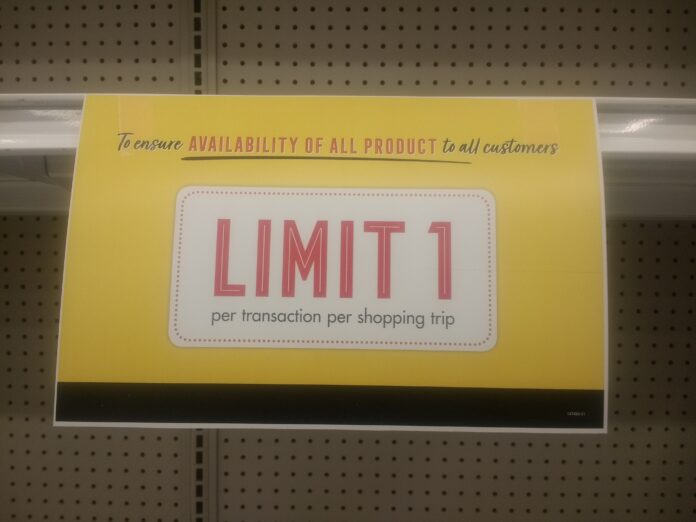Professors explain the difference between hoarding and mass buying, legality of price gouging
This week, The California Aggie spoke with Professor Donald Palmer of the UC Davis Graduate School of Management and Professor Gabriel “Jack” Chin of the UC Davis law school to talk about the economic and social implications of the current coronavirus pandemic.
Palmer, an economic sociologist whose research focuses on different forms of organizational misconduct, discussed the difference between hoarding and stockpiling food in response to changing economic conditions wrought by the outbreak of COVID-19.
“Hoarding implies that you are accumulating quantities of things beyond which you would need,” Palmer said.
“In this circumstance, if people are being advised to have 30 days’ worth of food and supplies, and you walk into their house and see lots more stuff than you normally see, I wouldn’t call that hoarding,” he added. “They’re preparing for the possibility that they might not get to go shopping.”
Palmer explained that uncertainty about how long the virus will last has caused people to buy larger quantities of items than they normally would.
Chin, whose work focuses on criminal law, immigration and race, among other topics, discussed the difference between state and federal laws addressing price gouging and hoarding, which pertain to the supply shortages caused by the pandemic.
“State law doesn’t prohibit hoarding, it prohibits price-gouging,” he said. “So when there is a declared emergency, businesses historically have raised their prices substantially. The way that [California Penal Code Section 396] works is that, [with reselling an item], it can’t sell for more than 10% than it was before, unless you can prove that prices are going up.”
According to Chin, this becomes more complicated when private entrepreneurs, like those affiliated with Amazon, become involved in reselling items.
“[With them], it’s not clear how this law applies, because there is no baseline price you were selling this stuff at before the emergency against which the 10% increase can be measured,” he said. “I don’t see what value that adds to society as opposed to people just paying the regular price and more people having access to these important goods. If Costco isn’t allowed to jack up the prices, why should a private seller?”
On the other hand, Chin noted that putting strict limitations on price gouging can have a negative effect, limiting the number of people participating in the market and potentially making it harder to obtain supplies.
“Where this breaks down is when we talk about life saving–medicine and technology,” he said. “I [wouldn’t want to see things like ventilators] allocated based on who could pay for them.”
Federal law prohibits hoarding of essential items for resale, but does not regulate the private market or keep prices down.
Instead, Chin explained, the federal government only takes over the market for certain items — materials that the President may deem essential. In this context, it’s a violation of federal law to hoard items that are considered necessary. This problem became evident in a recent FBI investigation of a man who hoarded and resold N95 respirator masks.
“My sense is that the White House minimized the seriousness of this until relatively recently, so I don’t think we can blame hoarding on the president,” he said. “But not being sufficiently prepared is sort of part of the president’s responsibility.”
Palmer said he believed people “are more rational” than those who study and comment on human behavior give them credit for.
“There’s a tendency of academics to look at people and say ‘this is irrational, this is crazy,’” Palmer said, adding that this tendency isn’t fair.
“That doesn’t mean there aren’t components of this situation that don’t fall under strict rational calculation,” Palmer said. “[But] people look to others in their environment to see, ‘How should I think? What should I think? What should I do?’”
Palmer believes that California Gov. Gavin Newsom has done a good job of adapting to the changing news about the virus, but that the messages from the White House have been less clear.
“[What Newsom did] is very different than where you’re giving incrementally dissonant messages — every time Trump spoke earlier on, he was saying something different than what he said before,” Palmer said. “That led to uncertainty, not only about what he’s doing, but a lack of confidence.”
According to Palmer, although some people may believe whatever Trump says, many are still trying to make sense of the news coming from the White House. As the situation has worsened, “he’s deferred more to exits,” Palmer said.
“This has generated problems, because the experts say things that he doesn’t want to be said,” he added, referring to internal conflicts on the president’s coronavirus task force.
Palmer noted that the polarization of news media has led to more confusion about the pandemic.
According to Chin, some people in the legal field falsely claim expertise about the implications of the virus. He referred to a recent article in The New Yorker which cited New York University law Professor Richard A. Epstein as having questioned the World Health Organization’s decision to call the coronavirus outbreak a pandemic.
Trump has also voiced skepticism about the virus, and he has also touted drugs of unproven effectiveness.
“I think President Trump’s intuition about [hydroxychloroquine] falls into this category,” Chin said. “He’s really not in a position [to talk] about whether this is a good treatment or not, and he’s running with this really casual information.”
Chin talked about the dangers of similar behavior on the part of lawyers and academics.
“If you’re practicing law, you do have to make decisions based on imperfect information with the best you can, but in this particular context, the impulse we all have to figure out the best we can based on limited information […] can be counter-productive,” he said. “I think that reliance on experts in the field is probably smarter.”
Written by: Rebecca Bihn-Wallace — campus@theaggie.org





